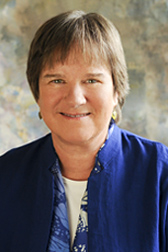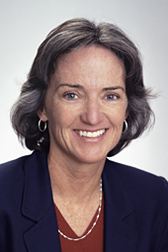|
|
Four Scientists Named to Agricultural Research Service Science Hall of Fame
By Rosalie Marion Bliss
September 8, 2016
WASHINGTON, Sept. 8, 2016—Four new plaques will soon hang on the walls at the U.S. Department of Agriculture (USDA) Agricultural Research Service (ARS) Science Hall of Fame. Those plaques will represent careers of accomplishment and discovery that have enhanced our understanding of soil-moisture sensing, the microbes used to produce fuel, and the biological control agents used to combat plant disease.
ARS honored the careers of Thomas J. Jackson, Cletus P. Kurtzman, Joyce E. Loper and M. Susan Moran during a ceremony at the ARS National Agricultural Library in Beltsville, Md. Established in 1986, the ARS program honors senior agency researchers for outstanding, lifelong achievements in agricultural science and technology and for mentoring other scientists.
"This year's inductees have made lasting, impactful contributions to agricultural science," said ARS Administrator Chavonda Jacobs-Young. "Their innovative approaches to problem-solving exemplify the values that make ARS the world's premier agricultural research organization."
Jackson, a research hydrologist at the ARS Hydrology and Remote Sensing Laboratory in Beltsville, Md., helped pioneer the use of satellites to track global soil moisture. He was the first scientist to successfully overcome the effects of the vegetation layer from remote-sensing measurements—a milestone for soil-water mapping. His efforts have improved famine early warning systems, crop yield forecasting, and the identification of disease outbreaks driven by variable soil moisture.
Kurtzman, a research microbiologist at the ARS Mycotoxin Prevention and Applied Microbiology Research Unit in Peoria, Ill., helped pioneer molecular techniques to identify yeast microorganisms. These discoveries enable scientists to accurately predict the biological properties of yeasts. This knowledge led to innovations in converting crop biomass into fuel, in producing biodegradable ingredients for detergents, and in food safety, crop production, and human and animal health advancements.
Loper, a recently retired research plant pathologist at the ARS Horticultural Crops Research Unit in Corvallis, Ore., is a world leader in the use of biological control agents to combat plant diseases. Loper's career centered on pioneering research in root-soil ecology, in bacterial plant diseases, and in bacterial genetics and genomics. Loper contributed key knowledge about the variability in soil microorganism populations that feed on root secretions. This knowledge has revealed important implications about the effectiveness of biocontrol agents used to mitigate plant diseases.
Moran, a recently retired research hydrologist at the ARS Southwest Watershed Research Center in Tucson, Ariz., is a pioneer in remote sensing of soil and vegetation in cropland and rangeland. That body of work provides a guide for regional water management and is used for irrigation scheduling in Spain, forest fire risk assessment in France, drought monitoring in Africa, and estimating grassland degradation in China. Her leadership in interagency collaborations ranges from work on mission science teams with the National Aeronautics and Space Administration to a report on impacts of extreme weather patterns on grasslands and forests with the U.S. Forest Service.
The Agricultural Research Service (ARS) is the U.S. Department of Agriculture's chief in-house scientific research agency. The agency's job is finding solutions to agricultural problems that affect Americans every day from field to table. ARS conducts research to develop and transfer solutions to agricultural problems of high national priority and provide information access and dissemination to ensure high-quality, safe food, and other agricultural products; assess the nutritional needs of Americans; sustain a competitive agricultural economy; enhance the natural resource base and the environment; and provide economic opportunities for rural citizens, communities, and society as a whole.
USDA is an equal opportunity provider, employer, and lender.




